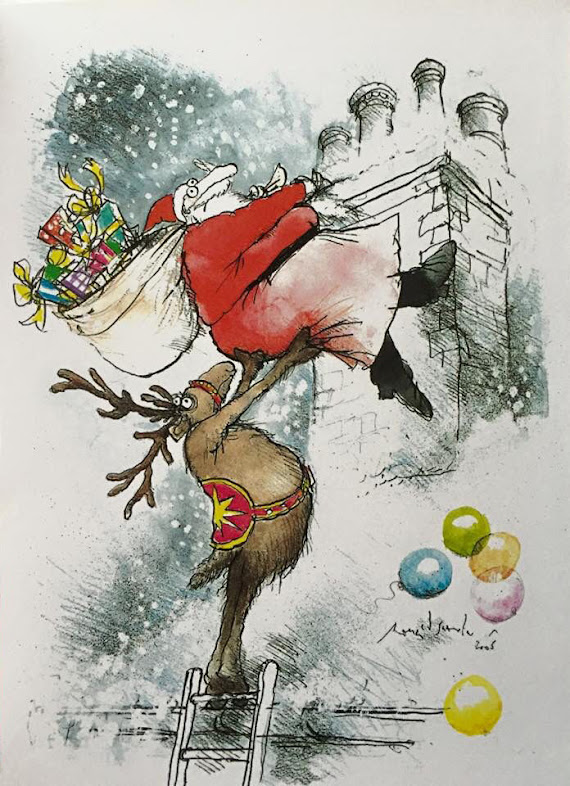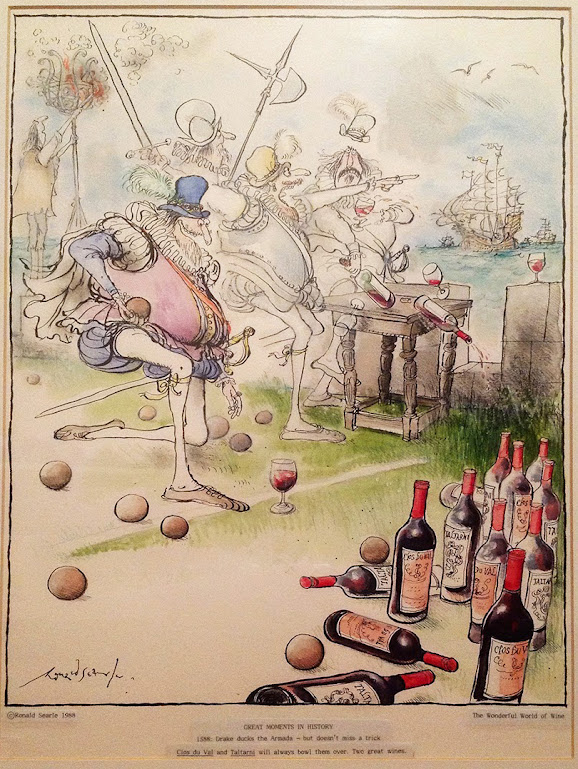The son of a railwayman, Ronald Searle was born in Cambridge on 3 March 1920, and educated in the town at the Boys' Central School. He started work as a solicitor's clerk, and then joined the hire purchase department of the co-operative Society, studying in the evenings and later full-time at the Cambridge Daily News from the age of fifteen.
This resulted in his first cartoon for Lilliput, published in October 1941, and later developed into one of his most famous creations, through a series of books and their cinematic spin-offs. Remarkably, he survived the horrific experiences of the Changi Camp, Singapore as a Japanese prisoner-of-war and managed to produce a visual record of life in a prison camp.
On his return to England in 1945, he exhibited the surviving pictures at the Cambridge School of Art, and published Forty Drawings. The exhibition and volume together established his reputation as one of Britain's most powerful draughtsmen, and led to several opportunities to record the atmosphere of post-war Europe. He contributed to Punch and these drawings crystallised in, The Female Approach (1949). Throughout the fifties, he produced a large variety of illustrations, which together seemed present a guide to life in Britain in the 1950's.
Such was his success that his rejection of family and country in a move to Paris in 1961 came as a great surprise. However, it offered a fresh start, resulting in several solo shows, including a major exhibitions at the Bibliotheque Nationale, Paris, the Berlin-Dahlem Museum and the Wilhelm-Busch-Museum, Hanover. He also reached a new audience with his contributions to film and television, most notably The Magnificent Men in their Flying Machines (1965).
Note: Searle did too many works to post in one series, so I am posting them in two separate series: 1940-1960, and 1961-2007.
For a more detailed biography see part 1, and for earlier works, see parts 1 - 13 (series 1) & parts 14-20 (series 2)
This is part 21 of a 26-part series on the works of Ronald Searle:
1978-2006 Father Christmas:
 |
| 1978 Christmas Wilhelm Busch – Deutsches Museum für Karikatur und Zeichenkunst © The Ronald Searle Cultural Trust |
 |
| 1978 Untitled Wilhelm Busch – Deutsches Museum für Karikatur und Zeichenkunst © The Ronald Searle Cultural Trust |
 |
| 1981 Christmas Magic Wilhelm Busch – Deutsches Museum für Karikatur und Zeichenkunst © The Ronald Searle Cultural Trust |
 |
| 1981 In the Bag: 44.5 x 33.1 cm Wilhelm Busch – Deutsches Museum für Karikatur und Zeichenkunst © The Ronald Searle Cultural Trust |
 |
| 1983 Santa Claws: 29.9 x 38.8 cm Wilhelm Busch – Deutsches Museum für Karikatur und Zeichenkunst © The Ronald Searle Cultural Trust |
 |
| 1989 Greeting the Santa Clauses Wilhelm Busch – Deutsches Museum für Karikatur und Zeichenkunst ©The Ronald Searle Cultural Trust |
 |
| 1996 Christmas: Punch magazine 20 December 1996 |
 |
| 1997 Architecture: 40.6 x 57.3 cm Wilhelm Busch – Deutsches Museum für Karikatur und Zeichenkunst © The Ronald Searle Cultural Trust |
 |
| 1997 Art: 40.6 x 57.6 cm Wilhelm Busch – Deutsches Museum für Karikatur und Zeichenkunst © The Ronald Searle Cultural Trust |
 |
| 1997 Bookends: 40.9 x 50.1 cm Wilhelm Busch – Deutsches Museum für Karikatur und Zeichenkunst © The Ronald Searle Cultural Trust |
 |
| 1997 Gardening: 40.6 x 57.3 cm Wilhelm Busch – Deutsches Museum für Karikatur und Zeichenkunst © The Ronald Searle Cultural Trust |
 |
| 1997 New York Times Christmas Book Review |
 |
| 1997 Photography: 40.6 x 57.3 cm Wilhelm Busch – Deutsches Museum für Karikatur und Zeichenkunst © The Ronald Searle Cultural Trust |
 |
| 1997 The Trojan Santa Claus: 33.9 x 44 cm Wilhelm Busch – Deutsches Museum für Karikatur und Zeichenkunst © The Ronald Searle Cultural Trust |
 |
| 1998 Untitled: 29.8 x 21 cm pencil. ink, coloured pencil, watercolour, fibre pen and opaque white Wilhelm Busch – Deutsches Museum für Karikatur und Zeichenkunst © The Ronald Searle Cultural Trust |
 |
| 2001 The Spectator magazine: December 2001 |
 |
| 2002 Anxious Reindeer: 48.8 x 37.2 cm Wilhelm Busch – Deutsches Museum für Karikatur und Zeichenkunst © The Ronald Searle Cultural Trust |
 |
| 2003 Untitled: 45 x 32.4 cm ink, coloured pencil, watercolour and wax crayon on card Wilhelm Busch – Deutsches Museum für Karikatur und Zeichenkunst ©The Ronald Searle Cultural Trust |
 |
| 2004 Noël 2004: 52.8 x 38 cm Wilhelm Busch – Deutsches Museum für Karikatur und Zeichenkunst © The Ronald Searle Cultural Trust |
 |
| 2005 Untititled |
 |
| 2006 Untitled: 45.2 x 32.6 cm ink, watercolour, coloured pencil and opaque white on card Wilhelm Busch – Deutsches Museum für Karikatur und Zeichenkunst © The Ronald Searle Cultural Trust |
 |
| 2011: 2012 New Year's Card dedicated to his wife Monica who died in July 2011 |
 |
| n.d. Robbing Santa: "This one is for you, this one for me" |
 |
| n.d. Untitled 1981 The Noble Grape Clos du Val winery in the Napa Valley, California and Taltarni vineyard in Moonambel, Australia: |
 |
| 1588: Drake ducks the Armada - but doesn't miss a trick. |
 |
| Great Moments in History: 1889 Gustave Eiffel towers above his contemporaries. |
 |
| Hawaii: Grape grappling time |
 |
| The Glorious Revolution of 1688: William and Mary abandon Orange for Red. |
 |
| Bacchus |
 |
| Front Cover |
 |
| Title Page |
 |
| The Exchange (from the French edition) |
 |
| Ambition |
 |
| The Coming of the Great Cat God |
 |
| Big Show |
 |
| Catahari |
 |
| Bye Bye Blues |
 |
| Congratulaions |
 |
| The Stranger |
 |
| Granny Smith |
 |
| The Stranger |
 |
| The Arrival of the Oracle |
 |
| Nightbird |
 |
| 1981 Too Many Songs by Tom Lehrer: Front Cover |
 |
| 1982 Back to Square One colour lithograph 65.4 x 5.2 cm Fine Arts Museums of San Francisco, CA |
 |
| 1982 I Have No Gun But I Can Spit |
 |
| 1982 The Twelve Days of Christmas—and a Partridge in a Pear Tree Christmas Card published by Camden Graphics, London |
 |
| 1983 Arrows Wilhelm Busch – Deutsches Museum für Karikatur und Zeichenkunst © The Ronald Searle Cultural Trust |
 |
| 1983 Positively the last balloon print of 1983 colour lithograph 65.4 x 50.2 cm |
 |
| 1984 Quo Vadis colour lithograph 65.4 x 50.2 cm |

















No comments:
Post a Comment
Note: only a member of this blog may post a comment.